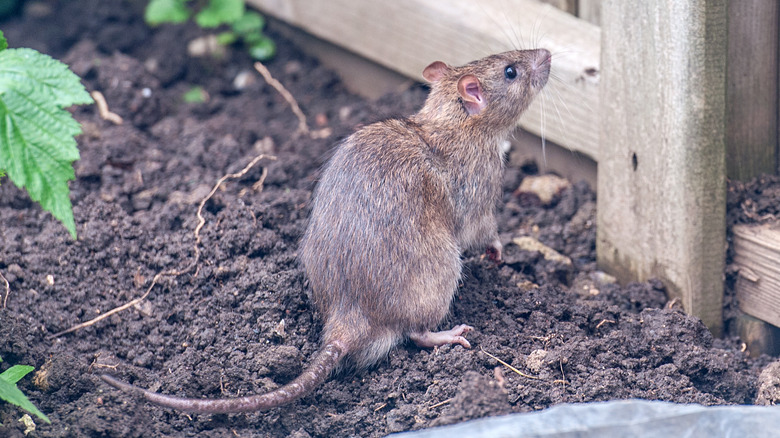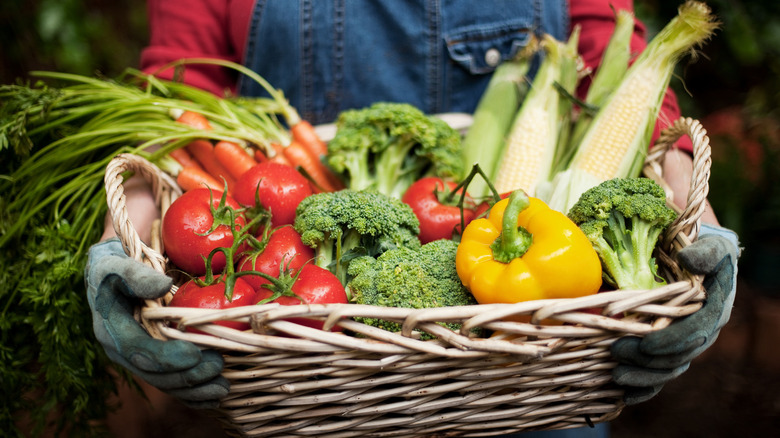Common Crops That Are Attracting Pesky Rats To Your Vegetable Garden
You've worked hard to cultivate a thriving vegetable garden, but the local rat population is taking notice. Rats are attracted to certain crops and are notoriously smart and agile at sniffing them out. They also adapt well to various environments, including urban and suburban settings, and are opportunistic and voracious omnivores. They won't hesitate to help themselves to your fruits, vegetables, or other readily available food sources.
If you've recently discovered signs of their presence — be it droppings, gnawed fruits, or burrowed tunnels snaking through the soil — it's time to confront the reality that you're not the only one enjoying the bounty of your labor. Rats see your garden as a regular feeding ground and can wreak havoc on your carefully cultivated plants, damaging or even decimating your yield. To maintain a rodent-free garden, it's crucial to take proactive steps to deter these unwelcome visitors. Carefully consider which crops you choose to plant, as some are more attractive to rodents than others. You may also want to incorporate plants that naturally repel rats.
Common crops that attract rats
Corn is a beloved staple crop for many gardeners due to its sweet and juicy kernels. However, rats view what you see as a culinary delight and a sign of your gardening prowess as a golden opportunity for a hearty meal, as corn provides them with plenty of nutritional value, including protein. In fact, corn often features as a staple in many commercial rodent foods. Rats will feast on crops whether they are still on the stalk or stored in the barn for future use. The tall stalks of corn plants offer excellent cover, creating a hideaway that allows rats to go about their business relatively undisturbed. Rodents are also quite fond of pumpkins and squash, as their flesh is rich and nutritious.
When planting these seasonal favorites, it's crucial to understand the risks of attracting rats. Rodents are persistent and troublesome once they've discovered the banquet that is your vegetable garden. To protect your hard work, you may need to employ various defensive strategies, such as eliminating gaps and other areas where they can take shelter, storing harvested produce in secure, rodent-proof containers like garbage cans, and putting up protective netting around vulnerable crops.
Crops that deter rodents
Including a few aromatic herbs that rodents dislike can be an effective way to keep them away from your garden. Certain vegetables and herbs can enrich your garden and act as natural rodent repellents. First on the list are perennial herbs like rosemary and mint. They can help protect your hard-earned produce and add an extra layer of scent and beauty to your outdoor space. The strong aroma of these herbs overwhelms the sensitive olfactory system of rodents, discouraging them from digging around in areas where they are growing. When planting rosemary, focus on pathways and fence gaps throughout the space to form a natural barrier. To increase its effectiveness, occasionally crush some leaves to release the essential oils that repel mice. Peppermint can also be planted around the perimeter of your garden or in pots scattered throughout the area.
Garlic and onions also work by overwhelming rodents' sense of smell. Planting them near more rodent-prone areas can act as a protective shield for other plants in your garden. As an added benefit, these plants also deter various insects. When planning your garden, keep these plants in mind; incorporating them into your gardening strategy serves a dual purpose. You'll have fresh, homegrown additions to your meals and a natural, chemical-free approach to deterring rodents that aligns well with sustainable gardening practices.


